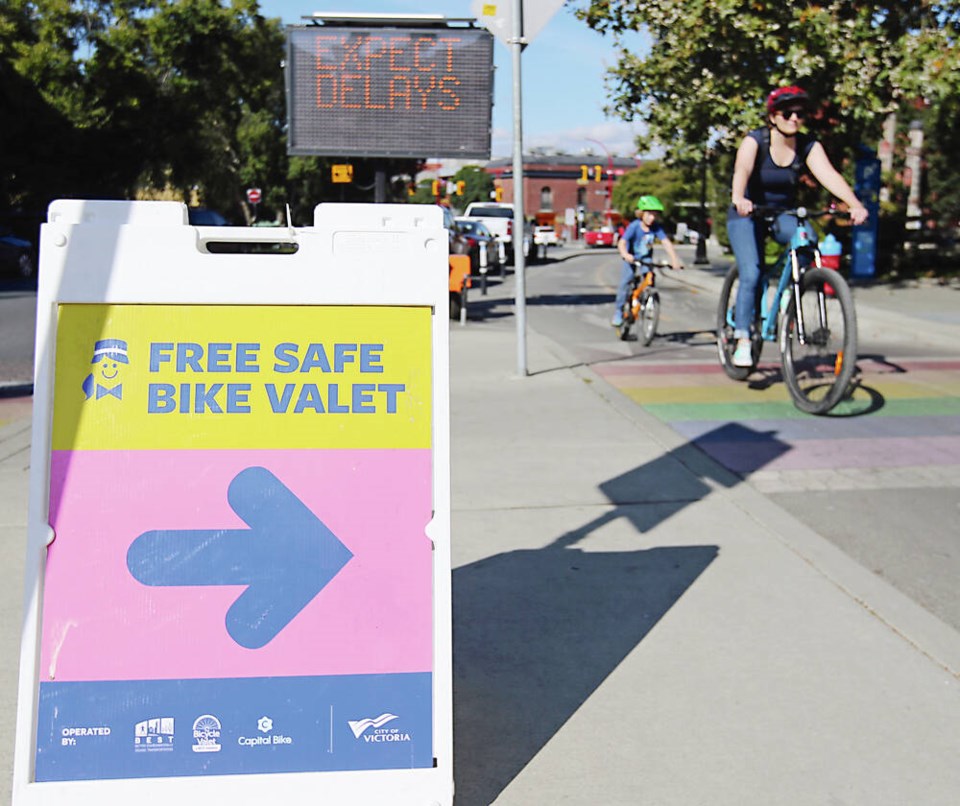A commentary by a former member of Victoria city council.
Charging for Victoria’s bike valet is amateur-hour economics and bad public policy. It won’t solve fiscal problems facing the city but will frustrate our objectives to help people make more sustainable transportation choices as they go about their business in the city.
Better bike parking is an essential service. It’s why, as a leading advocate, I challenged the city back in the late 1990s to do better.
I pushed back at rack designs for Douglas Street and the city then adopted a better design for the new streetscape. The inverted “U’ rack, now ubiquitous across the city, first appeared along Douglas.
I also pushed to have Victoria update building bylaws to ensure new multi-unit residential, institutional, and commercial buildings provided minimum numbers of secure, weather protected spots for long-term bike parking, and more freestanding racks for occasional users. The city is not, unfortunately, enforcing good hardware choices and effective site planning. They need to do better.
When I was elected to council in 2008, Victoria was just launching the pay-by-space parking system across downtown.
For many, parking meters served as informal bike racks. Those spots would be lost with the new plan, so I quickly had our engineering department install a few hundred more city racks to take up the slack.
Before my term was out, I also had a consulting team devise a new long-term bike parking strategy and instigate a design project that brought the “V-rack” – a stylized rack for multiple bikes that can now also be found around downtown.
I worked with the Downtown Victoria Business Association to survey demand for bike parking around the core, wrote a bike parking manual distributed around the province, presented at conferences and workshops, and have been helping developers, condo owners and others to design projects aimed at meeting the fast-growing demand for better bike parking solutions.
While president of the Greater Victoria Cycling Coalition, I brought valet bike parking to Folk Fest and, working with others, like “Chain, Chain, Chain,” expanded that to Bike to Work Week and other events that drew large numbers of cyclists into the city centre.
To the city’s credit, the free bike valet has been operating for the past couple of years, encouraging more people to ride downtown more often. Its appeal is growing, but a proposal to charge for the service threaten its success, if not its viability altogether. A reminder that most vehicles’ parking needs are provided for free, save for those downtown. A few blocks away along most residential streets or at village centres, parking is free for users.
We all pay for these spots. City streets are built and maintained through property taxes, which everyone pays, whether they drive or not. Licensing, insurance, and gas taxes contribute nothing to these costs; those who drive less often, or not at all, are subsidizing the motoring public.
Some insist that, because they have to pay for downtown vehicle parking, we must likewise charge for bike parking. That would frustrate sound public policy objectives and provide little financial benefit to the city’s taxpayers.
Pay parking generates revenues, but its primary objective is to benefit our downtown business economy. Time-limited pay parking enforces turnover, ensuring that street parking is provided for customers rather than residents or staff at downtown workplaces.
Not so with valet bike parking. People coming downtown by bike have options, not always ideal, but, if charges are imposed, they will find them, or, worse, shorten the duration of their visit, not come at all, or choose to drive instead.
It runs counter to the objective of enticing more people, more often, to come downtown and stay awhile. Space for bikes and turnover is not an issue; our footprint is small.
Penalizing us for choosing to bike downtown is not a good strategy. We’ve invested millions in infrastructure to support cycling while we are on the move, but cheaping out on services we need while our bikes are at rest works against that objective.
Bike valet does have a cost, but it is not going to be covered by user fees. It would charge itself out of existence.
Even a modest charge will erode the numbers of bikes parked, and, at the same time, increase costs for the service.
There would have to be a payment system, including cash transactions, demanding more security, more technology, more administration, all add-ons that have their own costs.
Council needs to realize that it is not an idea whose time has come.



